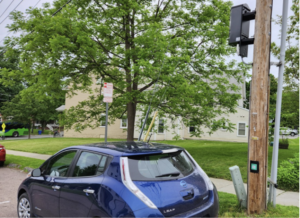This is part of a collection of case studies that focus on creative charging solutions for EV drivers in multifamily housing. For more information and the full collection, visit our Charging Solutions for EV Drivers in Multifamily Housing hub.
Challenge
For EV drivers in Burlington, VT, a city-wide goal of reaching Net-Zero Energy by 2030 helps drive creative solutions for EV charging for multifamily housing, including affordable housing. Burlington’s municipal electric utility boasts 100% renewable energy and continues to drive solutions toward sustainable electrification. Consistent with the utility’s mission, Burlington Electric Department (BED) has identified a creative solution to address access and affordability of EV charging for drivers living in multifamily housing who do not have access to off-street parking. Indeed, one appreciative customer shared the following thoughts: “I’ve been really happy overall with the pole-mounted chargers – they’ve been super convenient, and I honestly can’t say enough good things.”
Objectives and solution

BED identifies neighborhoods with high numbers of vehicles parking on the streets. Then, BED prioritizes those neighborhoods for the rollout of affordable EV charging and installs Level 2 EV chargers on curbside utility poles.
These utility-owned and operated chargers are installed 10 feet up on the poles to save space at street level and prevent damage from snow plows and other sources., Using the ampUp app, an EV driver can either scan a QR code on the pole or select the charger from the ampUp map, to trigger the charging cable to descend for easy charging. Not only is the charging convenient, but it’s also affordable, at $0.13 per kilowatt-hour (midnight to noon) and $0.21 cents per kilowatt-hour (noon to midnight). With these new chargers, all Burlingtonians, whether homeowners with space for a Level 2 charger on their property or multifamily renters with no off-street parking, have the opportunity to take advantage of the lower, off-peak charging rate.
BED is studying how well these chargers work and, if this pilot program is successful, will look to install more in additional neighborhoods where residents live in apartments without access to off-street parking. The program is also designed to include residents who live in affordable housing. BED suggests that utilities interested in exploring this technology test both the user interface with the app and the durability of the charging hardware.
Elements for success
- BED is not only providing access to charging for EV drivers, but is also identifying and providing access in areas where it is most needed. By prioritizing neighborhoods where residents do not have access to off-street parking, they are ensuring that the impact of each pole-mounted charger will be maximized.
- BED selected a unique charger configuration that will deter damage to and vandalism of charging cables and use existing utility infrastructure rather than adding new equipment in the curbside area, resulting in easier and quicker installs with no ground site-work.
References
- How Burlington hopes to make EV chargers more accessible
- Burlington Electric Department introduces new pole-mounted electric vehicle chargers to improve charging access
Recap
Charging cost: $0.21/kWh (noon to midnight) or $0.13/kWh (midnight to noon)
Charging type: Public
Problem addressed: Access, Equipment
Solution type: Utility
